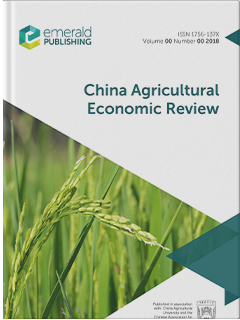公司的慈善事业是否会带来更多的使命:理论和证据
IF 4.6
2区 经济学
Q1 AGRICULTURAL ECONOMICS & POLICY
引用次数: 1
摘要
目的受农村选举候选人慈善捐款比较的启发,作者将慈善的非营利动机与企业污染排放联系起来。在此基础上,作者旨在为企业慈善事业与污染之间的关系提供理论和实证解释。作者发现,追求更多污染排放的愿望刺激了该公司的慈善事业,这与农村选举中的公益捐款类似。设计/方法论/方法首先,作者构建了一个由企业家和官僚组成的博弈论框架,通过企业对污染排放的影响来研究企业慈善事业的环境成本。其次,作者采用多种实证方法,包括混合OLS、IV-2SLS、PSM等,实证检验了企业慈善事业对企业污染排放的影响。最后,作者以产出和减排投入为中介变量,运用中介效应模型检验了企业慈善与企业污染排放之间的影响机制。发现理论模型发现,当理论模型处于政治平衡时,企业在慈善事业上的投资更多,排放更多。此外,实证结果表明,企业慈善会通过减少减排投入和增加产量来导致更多的污染排放。最后,异质性检验发现,与国有企业相比,非国有企业对更多污染排放的慈善意愿更为明显。此外,区域环境监管的完善会显著抑制企业慈善不良动机的实现。研究结果对中国未来的政策制定具有明显的政策启示。首先,监管机构应密切关注环境负外部性严重的企业的慈善行为,防止它们以慈善行为取代更多的污染排放。此外,由于农村环境监管薄弱,农村污染企业将更倾向于向村集体进行慈善捐赠,以获得更多的排放权。因此,政府应加强对农村地区环境的监督,防止企业肆意污染。独创性/价值通过构建一个由企业家和官僚组成的博弈理论框架,首次从理论上阐述了企业慈善的污染动机和决策机制。此外,本文发现,追求更多污染排放的愿望也刺激了该公司的慈善事业。本文扩展了有关企业慈善捐赠动机的文献。本文章由计算机程序翻译,如有差异,请以英文原文为准。
Does firm's philanthropy lead to more missions: theory and evidence
PurposeInspired by the comparison of charity donations among candidates in rural elections, the authors linked the non-profit motives of charity to corporate pollution emissions. And on this basis, the authors aim to provide theoretical and empirical explanations for the relationship between corporate philanthropy and pollution. The authors find that the desire to pursue more pollution emissions stimulates the firm's philanthropy, which is similar to the public welfare donations in rural elections.Design/methodology/approachFirstly, the authors construct a game-theoretical framework consisting of an entrepreneur and a bureaucrat to study the environmental cost of corporate philanthropy through the impact on pollution emission by the firm. Secondly, the authors used various empirical methods, including hybrid OLS, IV-2SLS, PSM, etc., to empirically test the impact of a firm's philanthropy on corporate pollution emissions. Finally, the authors use the output and abatement input as intermediary variables and apply the intermediary effect model to test the impact mechanism between corporate philanthropy and corporate pollution emissions.FindingsTheoretical model finds that the firm invests more in philanthropy discharges more emissions when the theoretical model is in political equilibrium. Besides, empirical results show that corporate philanthropy will lead to more pollution emissions by reducing abatement input and increasing production. Finally, the heterogeneity test finds that compared with state-owned enterprises, the intention of non-state-owned enterprises' philanthropy for more pollution emission is more obvious. Moreover, the improvement of regional environmental regulation can significantly inhibit the realization of corporate philanthropy's poor motive.Practical implicationsThe results have obvious policy implications for China's future policy-making. Firstly, regulatory agencies should pay close attention to the charitable behaviors of firms with serious negative environmental externalities, and prevent them from replacing more pollution emissions with philanthropy. Besides, due to weak environmental supervision in rural areas, rural polluting enterprises will be more inclined to make charitable donations to the village collective to obtain more emission rights. Therefore, the government should strengthen environmental supervision in rural areas to prevent enterprises from wanton pollution.Originality/valueBy constructing a game-theoretical framework consisting of an entrepreneur and a bureaucrat, the authors expound on corporate philanthropy's pollution motivation and decision-making mechanism for the first time in theory. Besides, this paper finds that the desire to pursue more pollution emissions also stimulates the firm's philanthropy. This paper expands the literature on corporate charitable donation motivations.
求助全文
通过发布文献求助,成功后即可免费获取论文全文。
去求助
来源期刊

China Agricultural Economic Review
AGRICULTURAL ECONOMICS & POLICY-
CiteScore
9.80
自引率
5.90%
发文量
41
审稿时长
>12 weeks
期刊介绍:
Published in association with China Agricultural University and the Chinese Association for Agricultural Economics, China Agricultural Economic Review publishes academic writings by international scholars, and particularly encourages empirical work that can be replicated and extended by others; and research articles that employ econometric and statistical hypothesis testing, optimization and simulation models. The journal aims to publish research which can be applied to China’s agricultural and rural policy-making process, the development of the agricultural economics discipline and to developing countries hoping to learn from China’s agricultural and rural development.
 求助内容:
求助内容: 应助结果提醒方式:
应助结果提醒方式:


